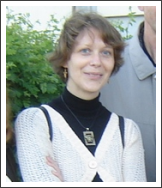Nina A. Almazova was born in 1971 in Leningrad. In 1993, graduated from the Department of Classics at St. Petersburg State University. From 1993-1997, she completed her graduate studies at the Institute of the History of Art of the Russian Academy of Sciences.After spending a year at the Trier University on a DAAD fellowship, she obtained her Ph. D. in arts (“Musical Epigraphy in Antiquity”, 1998). From 1991-2004, and currently she teaches Ancient Greek at the Gymnasium Classicum Petropolitanum. Since 1997, she has worked in the Department of Classics of St. Petersburg State University (currently as a docent). She teaches courses in the Ancient Greek and Latin languages, lectures on ancient Greek and Latin literature, and teaches a course on the history of Classical art. In 2002, she received a visiting fellowship at Trinity College (Cambridge). In 2008 (autumn), she was a visiting scholar at the Fondation Hardt pour l’etude de l’antiquite classique (Vandoeuvres–Geneve). She a member of the editorial board of the journal “Hyperboreus.” Her research interest lies in the history and practical aspects of ancient Greek music (life of musicians, repertoire, performance details, etc.).
Publications
Author:
1997
ΑΓΩΝΕΣ ΙΣΟΠΥΘΙΟΙ в эллинистическую эпоху // Philologia classica. № 5. ΜΝΗΜΗΣ ΧΑΡΙΝ. К 100-летию со дня рождения проф. А. И. Доватура. СПб., 1997. С. 40–47.
Детские хоры на греческих празднествах // ΜΟΥΣΕΙΟΝ. Профессору А. И. Зайцеву ко дню семидесятилетия. СПб., 1997. С. 138–149.
Der Schlußagon bei den griechischen musischen Spielen // Hyperboreus. Studia classica. Vol. 3, 1997, fasc. 1. С. 41–56.
1998
Артист Диониса или сотрапезник Аполлона? // Hyperboreus. Studia classica. Vol. 4, 1998, fasc. 1. С. 113–121.
2000
Античная музыка: новые исследования и материалы // Индоевропейское языкознание и классическая филология. Материалы чтений, посвященных памяти проф. И. М. Тронского. СПб., 2000. С. 3–9.
2001
К характеристике инструментального нома // Hyperboreus. Studia classica. Vol. 7, 2001, fasc. 1–2. С. 80–90.
2004
Детские мусические состязания в эллинистическую эпоху // Philologia classica. № 6. Cathedra Petropolitana. СПб., 2004. С. 172–178.
2006
ΠΡΟΚΙΘΑΡΙΣΤΗΣ // Hyperboreus. Studia classica. Vol. 12, 2006, fasc. 1–2. С. 261–278.
2007
Специальные учебные заведения для музыкантов в Древней Греции // Познавая историю музыки прошлого. Владивосток, 2007. С. 65–71.
Древнегреческий язык: Сборник упражнений по элементарной грамматике. СПб., 2007. 48 с.
2008
On the meaning of ΑΥΛΩΙΔΙΑ, ΑΥΛΩΙΔΟΣ // Hyperboreus. Studia classica. Vol. 14, 2008, fasc. 2. С. 5–34.
2010
Zur Verwendung des ΒΗΜΑ bei den musischen Darbietungen // Hyperboreus. Studia classica. Vol. 16–17, 2010/2011. С. 26–31.
2012
Lyre in Public Performance? // Rudiae. Ricerche sul mondo classico 22–23 (2010-2011) vol. II, 457–488.
A Lyre on the Ground // Hyperboreus. Studia classica. Vol. 18, 2012, fasc. 1. P. 54–74.
2014
When was the Pythian nome performed? // Hyperboreus. Studia classica. Vol. 20, 2014, fasc. 1–2. P. 56–91.
Chariot in Ancient Greece in the 7th–4th Cent. BC: Some Observations/Philologia Classica. № 9. St. Petersburg, 2014. P. 12–41 (in Russian).
Harmateios nomos // MAIA. Vol. 66, 2014, fasc. 3. P. 518–538.
2015
The Boeotian Nome // Philologia Classica. № 10. St. Petersburg, 2015. P. 7–30 (in Russian).
De curribus Hyacinthiorum sacris adhibitis (Athen. 4.139F) // Hermes 2015. Bd. 143. Heft 4. S. 508–512.
On the Authenticity of Eur. Or. 1384 // Philologus 2015. Bd. 159: 2. S. 207–223.
2016
Cradias Nomos // Philologia Classica. Том 11, № 1. СПб., 2016. С. 20–31.
Daktylus und Enhoplios in Damons Rhythmuslehre // Hyperboreus. Studia classica. Vol. 22, 2016, fasc. 1. P. 94–126.
2017
De tibicine Pythico ludisque Nemeis // Mnemosyne 2017. Vol. 70. P. 150–158.
On the Javelin Simile in Pindar Nemean 7. 70–73 // GRBS 2017. Vol. 57. No. 1. P. 1–15.
2018
Sound Mimicry: An Old Trait of the New Music? // Hyperboreus Studia classica. Vol. 24, 2018, fasc. 1. P. 52–88.
2019
Recognition Based on Paralogism (Aristot. Poet. 1455 a 12–16) // Hyperboreus. Studia classica. 2019, vol. 25, fasc. 2. P. 302–327.
Orthios as a Rhythmical Term // Philologia Classica 2019. Vol. 14, fasc. 2. P. 164–176.
2020
Orthios as a Quality of Sound // Philologia Classica 2020. Vol. 15, fasc. 1. P. 25–36.
2021
Artistic Heretage of Polymnestus of Colophon // Mnemosyne. 2021. Vol. 74, fasc. 3. P. 357–370. DOI: https://doi.org/10.1163/1568525X-12342802
Alexander Polyhistor and Glaucus of Rhegium as Sources of Pseudo-Plutarch’s Treatise De musica. I–II // Hyperboreus Studia classica. Vol. 27, 2021, fasc. 2. P. 266–290. DOI: 10.25990/hyperboreus.s4e8-7v47.
2022
Память о перенесенных тяготах (Pi. Pyth. 1. 46–48) // Verus convictor, verus academicus. К 70-летию Николая Николаевича Казанского. СПб.: Институт лингвистических исследований, 2022. С. 20–31.
Alexander Polyhistor and Glaucus of Rhegium as Sources of Pseudo-Plutarch’s Treatise De musica. III–IV // Hyperboreus Studia classica. Vol. 28, 2022, fasc. 1. P. 53–70. DOI: 10.25990/hyperboreus.94x8-rx93
Editor:
2013
К. Персон и др. ΠΡΟΠΥΛΑΙΑ: Хрестоматия по древнегреческому языку. 2-е изд. СПб.: Санкт-Петербургская классическая гимназия, 2013. 222 с. (with V.V. Zelchenko)
2016
Ianua Nova. Хрестоматия по латинскому языку. Часть I. 2-е изд. СПб.: СПб. классическая гимназия, 2016. 192 с. (with V. V. Zelchenko)
2018
(совместно с В. В. Зельченко): Х. Хольтерман, Х. Баумгартен. Ianua Nova. Хрестоматия по латинскому языку. Часть II. 2-е изд. Переработали Х. Папенхофф и Х. Гаппа. СПб.: «БХВ-Петербург», 2018. 174 с.
Translator:
2007
(Translation from Latin, notes): Л. Эйлер. Опыт новой теории музыки, ясно изложенной в соответствии с непреложными принципами гармонии. СПб., 2007. С. 11–216 (перевод, примечания); 217–218 (От переводчика); 271–272 (Определения терминов в тексте Эйлера)

